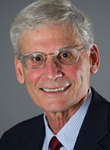ILR's Gary Fields wins International Labor Economics Prize
By Mary Catt

Gary Fields has won the 2014 IZA Prize in Labor Economics, the world’s top award in the field, it was announced Nov. 17 in Bonn, Germany.
Fields, a member of Cornell’s economics department and the ILR School’s John P. Windmuller Chair in International and Comparative Labor, joins an elite group of IZA Prize-winning economists.
The IZA Prize in Labor Economics is awarded annually for outstanding academic achievement in the field of labor economics.
The Institute for the Study of Labor (IZA) is a private, independent economic research institute focused on global labor market analysis. The nonprofit organization is based in Bonn and is supported by the Deutsche Post Foundation.
Fields’ work focuses the world’s poorest people. His 2012 book, “Working Hard, Working Poor,” illustrates that global poverty is a problem of the quality of employment and not, as widely believed, a matter of high unemployment rates, the institute said in a statement.
Decades ago, Fields bucked the conventional approach in economic research, which had been to ask whether a specific type of distribution pattern promotes or hinders growth. “Fields turned this approach upside down and called on economists to analyze how the rate and type of growth helps or hinders distributional goals,” IZA leaders said.
At age 23, Fields embarked on a life-changing journey – his first outside of North America – that he balked at initially. He wasn’t sure he wanted to abandon his dissertation momentum when his adviser asked him to join a year-long research project in Kenya.
Fields credits his wife, Vivian, with seeing the value the opportunity offered.
Forty-five years later, Fields’ global research in 40-plus countries has led to influence on World Bank lending programs in developing countries and impact on nations such as South Korea, where he helped build a number of labor market programs from scratch.
His research has taken him into the homes of some of the world’s poorest people. Half of humanity, he said, lives on less than $2.50 per day: “I feel so incredibly fortunate to live the way I do. At the same time, I feel enormous empathy for people who live with so little materially.”
Fields was recruited by Cornell 37 years ago from Yale University. “I actively work in three areas – teaching, research and the policy world. One area informs another, which is the great beauty of a research university,” he said.
“When I discover something I didn’t know and I put it out there and other people learn from it,” it is euphoria – as is the facial expressions of students that signal “I’ve gotten into their heads,” he said.
Fields is slated to receive the prize Jan. 4, 2015, at the Allied Social Science Associations meeting in Boston and has been invited to lead a scientific event for the IZA-World Bank Employment and Development Conference June 4-6, 2015, in Bonn.
Mary Catt, MPS ’14, is assistant director of communications at the ILR School.
Media Contact
Get Cornell news delivered right to your inbox.
Subscribe